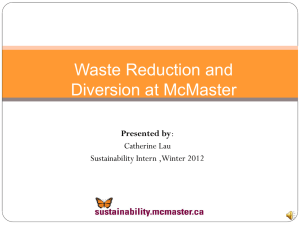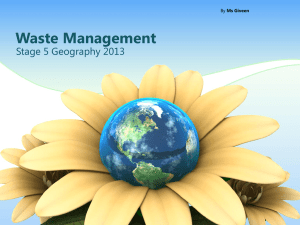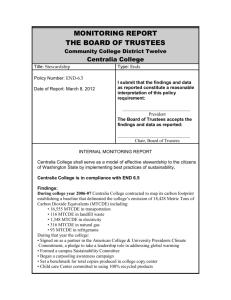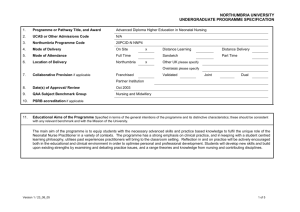Environmental Policy Northumbria University has a long established
advertisement
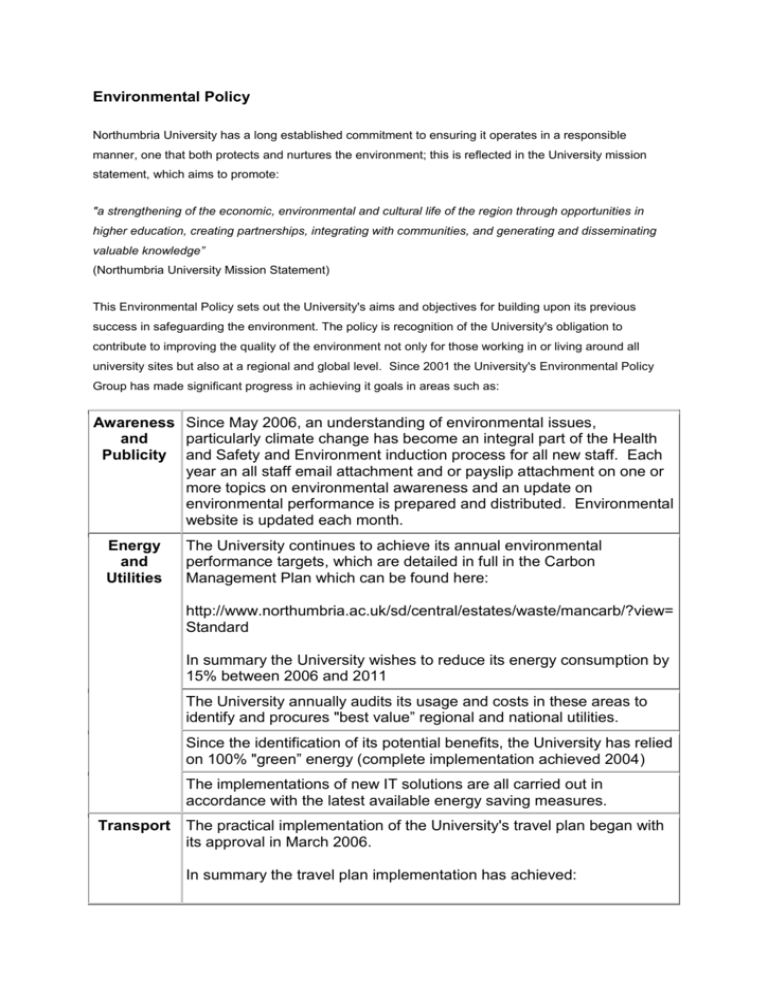
Environmental Policy Northumbria University has a long established commitment to ensuring it operates in a responsible manner, one that both protects and nurtures the environment; this is reflected in the University mission statement, which aims to promote: "a strengthening of the economic, environmental and cultural life of the region through opportunities in higher education, creating partnerships, integrating with communities, and generating and disseminating valuable knowledge” (Northumbria University Mission Statement) This Environmental Policy sets out the University's aims and objectives for building upon its previous success in safeguarding the environment. The policy is recognition of the University's obligation to contribute to improving the quality of the environment not only for those working in or living around all university sites but also at a regional and global level. Since 2001 the University's Environmental Policy Group has made significant progress in achieving it goals in areas such as: Awareness Since May 2006, an understanding of environmental issues, and particularly climate change has become an integral part of the Health Publicity and Safety and Environment induction process for all new staff. Each year an all staff email attachment and or payslip attachment on one or more topics on environmental awareness and an update on environmental performance is prepared and distributed. Environmental website is updated each month. Energy and Utilities The University continues to achieve its annual environmental performance targets, which are detailed in full in the Carbon Management Plan which can be found here: http://www.northumbria.ac.uk/sd/central/estates/waste/mancarb/?view= Standard In summary the University wishes to reduce its energy consumption by 15% between 2006 and 2011 The University annually audits its usage and costs in these areas to identify and procures "best value” regional and national utilities. Since the identification of its potential benefits, the University has relied on 100% "green” energy (complete implementation achieved 2004) The implementations of new IT solutions are all carried out in accordance with the latest available energy saving measures. Transport The practical implementation of the University's travel plan began with its approval in March 2006. In summary the travel plan implementation has achieved: Staff Car commuting down 30% 2005 to 2007 Staff Public Transport commuting up 30% 2005 to 2007 Staff Cycle commuting up 51% 2005 to 2007 Travel survey due in May 2009 Full statistical analysis, modal shift timed targets can be found here: http://northumbria.ac.uk/static/5007/travelplan_0708.pdf Waste The 2002/3 review of University waste management led to the University's "Waste Management and Reduction Strategy”. In April 2009 the University signed a new waste management contract to ensure it increases the reuse and recycling of waste materials In the first three weeks the target of 90% recycling of all waste streams had been fully met Paper recycling has been a University wide since January 2006. Paper recycling is continuing to increase, but paper reduction is more important and all printing where possible will be defaulted to double sided printing 16 tonnes in 2005 recycled 73 tonnes in 2006 recycled 134 tonnes in 2007 recycled 120 tonnes in 2008 recycled As with all waste a target of 90% recycling is now expected for paper in 2009 Paper consumption for photocopying in central reprographics has fallen through double sided printing 2006 2007 2008 18.3 million sheets used 15.5 million sheets used 13.0 million sheets used In July 2006, the University fully implemented a policy for the re-use of office furniture. Since 2006 approximately 1,000 items of furniture have been re-used internally or externally Estates The University’s bio-diversity policy was agreed in 2009 and a rolling Manageme programme is being set to implement the actions in this policy nt The Sustainability Design Team provided their brief for City Campus East in May 2005 this has been furthered by another sustainability design brief prepared in 2008 for the new Sports Facility currently under construction. A further sustainability design brief was prepared for the major refurbishment of Sutherland Building currently underway Environmental Policy Statement Northumbria University recognises that its activities and wider influences impact upon the environment. It is committed to full compliance with environmental legislation and will strive to continuously improve its environmental performance. The University will seek to develop amongst staff and students an appreciation of their role in bringing about environmental improvement both as members of the University community and as members of society at large. Pursuant of these aims the University will: in relation to awareness and publicity: promote awareness of environmental issues and its environmental policy amongst staff, students and the organisations and individuals with whom it is associated provide appropriate mechanisms for staff and students to contribute to the development of its environmental programme ensure that it has access to up to date information on environmental legislation and best practice in order to make informed decisions publicise its efforts in relation to environmental management to a wider audience in relation to energy and utility use: implement an effective energy and utilities management strategy to reduce consumption and associated environmental impact as well as cost implement, monitor, record and evaluate target performance levels for individual buildings by extended utilisation and extension of energy management software and systems increase consumption of 'green' energy sources as a proportion of total energy consumption, consistent with a value for money approach hypothecate savings made from energy and utilities conservation measures for investment in further measures actively promote awareness of energy saving and conservation issues amongst staff, students and the general users of the University and its facilities in relation to estate management: consider 'whole life' costs and environmental impact in the design, specification and procurement of construction and building services projects implement environmental efficient design as a key criteria in the development of new buildings and major refurbishment of existing buildings utilise items contributing to environmental improvement and good practice in relation to the general upgrading and maintenance of the University estate take account of the implications for energy efficiency in relation to the planned use and operation of buildings and facilities enhance the visual appearance of the campus by careful design and maintenance of external spaces pay careful consideration to the implications for biodiversity when designing and maintaining external spaces in relation to purchasing: buy less, but better, in order to minimise impact on the environment where costs are consistent with 'value for money', consider and purchase goods and services which are manufactured/remanufactured, used and disposed of in an environmentally friendlier manner assess major suppliers current practice with regard to environmental issues consider where appropriate 'whole life' costs and environmental impacts when assessing tenders for goods and services in relation to transport: adopt and implement a comprehensive travel plan which advises, encourages and assists staff and students to use the most sustainable mode of transport available to them when travelling to and from the University continue to increase the amount of University vehicles which have lower and less harmful emissions work with suppliers, where transport is a major factor, in our purchasing of their services to encourage and actively promote improvement in their own fleet environmental performances. in relation to waste management: reduce the generation of solid waste, atmospheric emissions and effluent ensure that waste is managed in a manner consistent with legal requirements and best practice increase the reuse and recycling of waste materials Management of the Policy Responsibility for the implementation of the environmental policy rests with all members of the University community. However, certain departments and individuals, as a result of the nature of their work, will have a key role to play. The Deputy Vice-Chancellor (Resources) has overall responsibility for the environmental policy. Responsibility for strategic management lies with the Environmental Policy Working Group, which has the following terms of reference: to advice upon, keep under review and promote the University's Policy for the Environment to ensure that the Executive, the Schools and all Service Departments are kept informed of the policy and their obligations under it to monitor the implementation of the policy to receive reports from members of the group regarding progress prepare an annual review of the policy and its implementation to commission, where appropriate, surveys, design work and other activities attendant upon operation of the policy University Sustainability Management Group Membership 2013 Senior member of each Faculty and Service Department, as well as University’s Environmental Adviser attends each meeting which will be chaired by a member of the University Executive Updated 2013
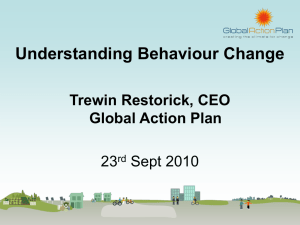




![School [recycling, compost, or waste reduction] case study](http://s3.studylib.net/store/data/005898792_1-08f8f34cac7a57869e865e0c3646f10a-300x300.png)
